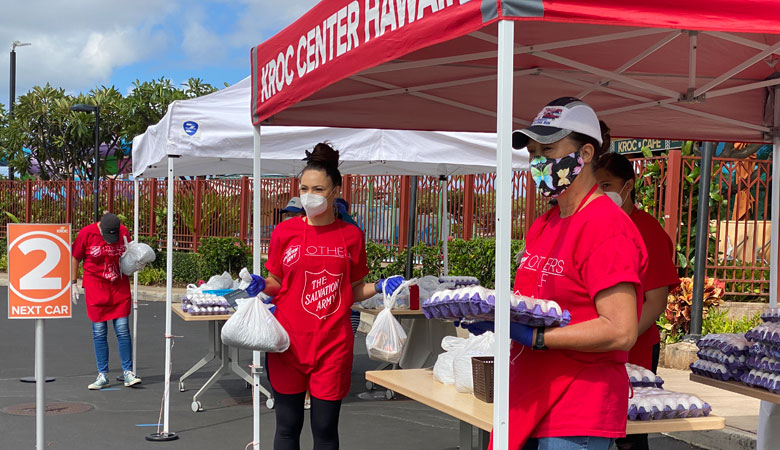Globally, COVID-19 has now claimed more than 655,000 lives according to World Health Organization statistics, with around 16.5 million confirmed cases. While some countries are starting to relax disease-prevention regulations designed to curb the spread of the virus, there are concerns of a "second wave" in others. The Salvation Army continues to serve individuals, families and communities affected in numerous ways by coronavirus and the economic ramifications of control measures.
Salvation Army world leader, General Brian Peddle, has released a short video message outlining the movement’s response on an international level. In this, he speaks of the partnerships and generosity of donors that have facilitated emergency responses helping more than 2.1 million beneficiaries through International Headquarters-supported initiatives. However, he notes that "our work is not complete."
"We continue to respond and to serve," says the General. "Please continue to partner with us financially, and through acts of service and in prayer."
Grassroots responses include the provision of in excess of one million meals in Connecticut, USA, alone. Always coupling the practical assistance with a no-strings-attached opportunity for recipients to share concerns and challenges, Salvation Army team members there have provided emotional and spiritual care to nearly 4,000 individuals. More than 800 volunteers in the region have bolstered The Salvation Army’s capacity by providing important logistical support.
"Every week since the start of the COVID-19 pandemic, I have sent out volunteer opportunities available at our various locations and every week I am amazed with the faithful volunteers that are stepping up to meet that need," says Katheryn Perrett, Volunteer Coordinator for The Salvation Army’s Southern New England Division. "Whether it was packing emergency food boxes, unloading food deliveries or donations, or helping at the distribution sites … these volunteers have made it happen! They come in with a joyful spirit ready to serve those in need. We are just so appreciative to those who are willing to give of their time to come alongside The Salvation Army!"
Meanwhile, in the English Midlands, The Salvation Army’s Derby Central Corps (church) leader noticed something unusual in one of the hundreds of requests for emergency food parcels. A man in his late 40s had specifically requested food that didn’t need cooking. Major Anthony Colclough followed this up with a phone call to the gentleman, who explained that he had no facility to heat food, and had been eating cold baked beans, spaghetti and soup "for the past 27 years."
The Salvation Army was able to provide the individual concerned not just with a food parcel but with a microwave oven in which to prepare simple meals. As the man had never used such equipment before, Major Anthony was able to provide further support.
"Our community-based corps work is ideally placed to find the people who are barely coping and need our support," explains the major. "We can see that people like this gentleman may have deeper needs and we can respond to that. Asking a question often reveals more. The Salvation Army can help communities face the future … with financial advice and debt support, for example. We are looking at the longer-term needs of local people and how we can assist them in the future with dignity.
"Helping people like this drives us on. Hearing about the difference this small gesture has made has cheered on the volunteers at the community hub."
It’s a similar story at The Salvation Army’s centres in Melbourne, Australia, where a new campaign entitled ‘A small action can make a big difference’ has launched. A week ago – due to an increase in people testing positive for COVID-19 in the city – it became mandatory for people to wear face coverings. But, as National Public Relations Secretary Major Bruce Harmer explains, sourcing masks may be difficult for many of the people The Salvation Army works with.
"We’re really concerned for the clients that come to see us on a regular basis," he says. "Many of them are in a position where they can’t afford disposable masks, which can be quite expensive if you are moving through them regularly."
Salvationists and supporters in the Greater Melbourne area are therefore being encouraged to help by donating individually wrapped, handmade adult-sized masks. Again, recognising that the initiative is designed to meet not just practical needs but emotional care too, donors are urged to "include an uplifting message or note to encourage the people we will be assisting." The early response has been positive.
The Salvation Army in The Netherlands has been lifting spirits through a generous donation of doughnuts, given out free to volunteers, supporters and service users to mark the reopening of Salvation Army community centres in the European nation. The partnership with local company Donut Worry Be Happy saw more than 36,000 treats given out as a symbol of The Salvation Army’s enduring care in times of difficulty.
Also, a total of 1,150 tablet computers have been distributed by The Salvation Army to Dutch children and young people unable to access their education since schooling moved online earlier in the year. The provision of this technology also helps to improve connectedness, especially with families in complex situations.










Leave a Comment